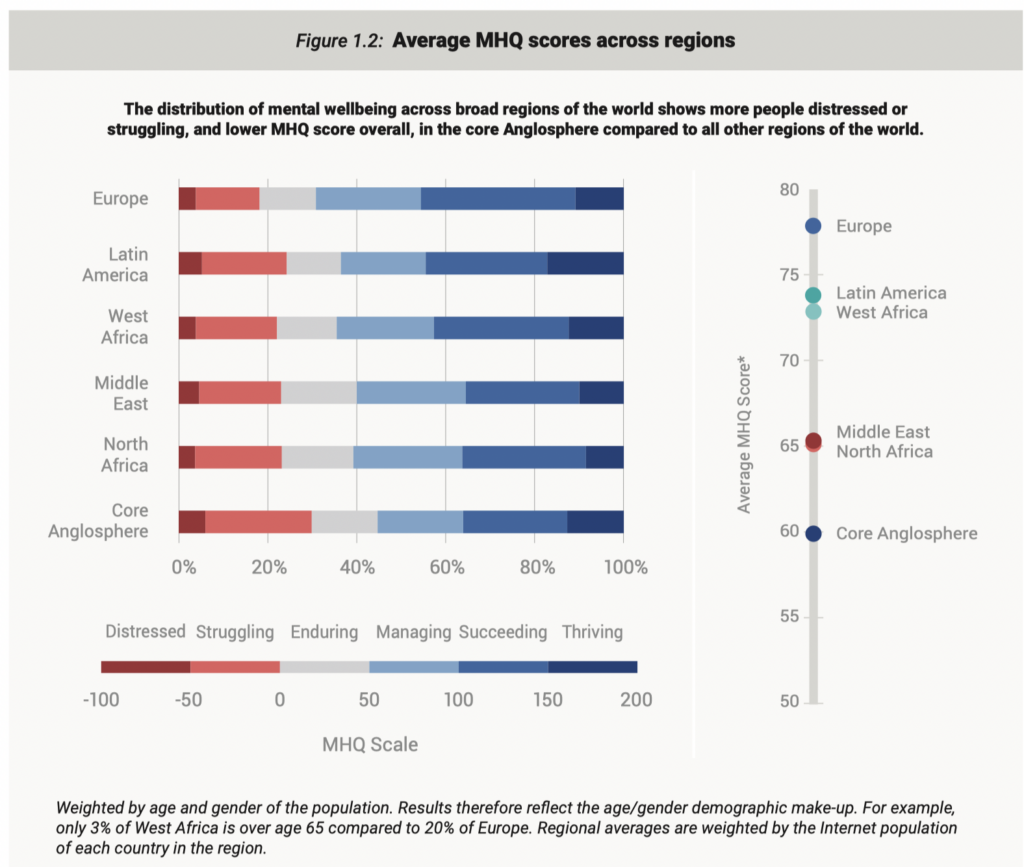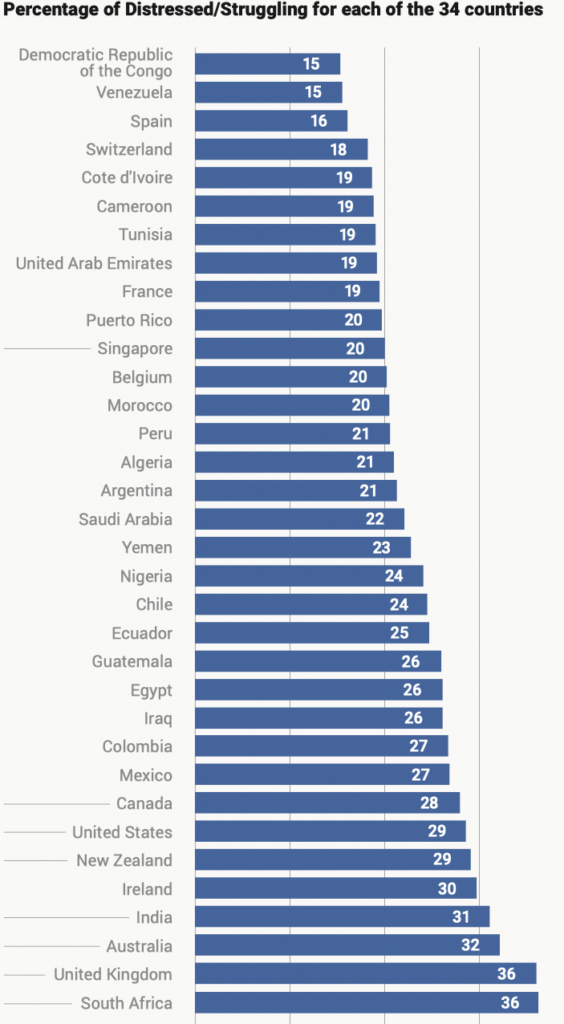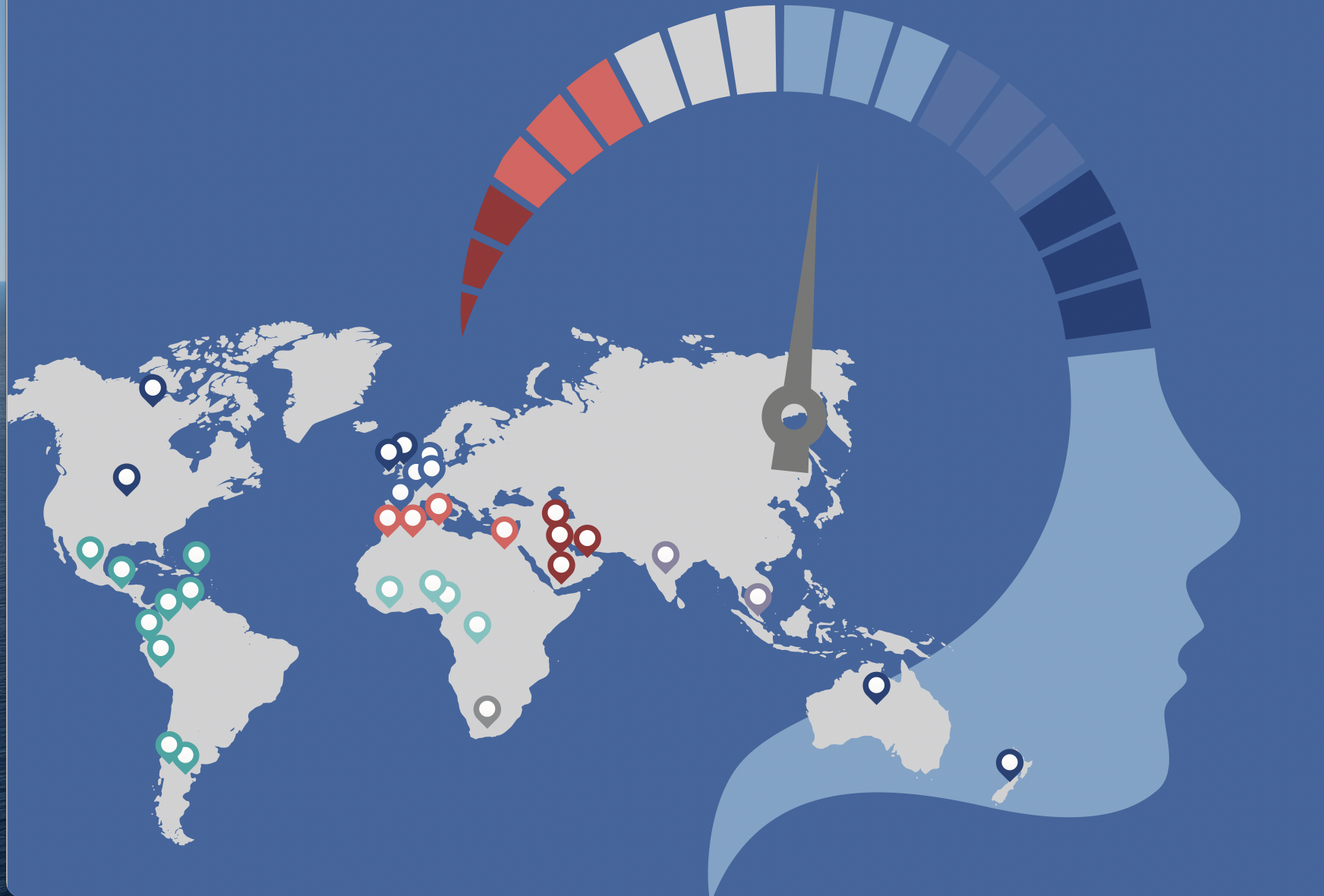A survey of 233,087 “internet users” in 34 countries that measured “mental wellbeing” found that the percentage of respondents who were “distressed or struggling” was highest in English-speaking regions of the world, where 30% fell into this category. The regions that scored the best in this survey were Latin America and Europe, with countries in the Middle East and North Africa falling in the middle of the pack.
The survey was conducted by a nonprofit organization, Sapien Labs. This particular effort, dubbed the Mental Health Million Project, is designed to provide an “evolving global map of mental wellbeing,” with the hope that the results will provide insight into the cultural factors that promote wellbeing, and that these findings can then be put to use to enact “evidence-based social policy and interventions.”
To assess mental wellbeing, Sapien Labs used the Mental Health Quotient (MHQ), an anonymous online survey that can be completed by speakers of English, Spanish, French and Arabic in 15 minutes. It assesses 47 elements of mental function and maps them to diagnostic criteria for 10 disorders listed in the DSM-5, with aggregate scores used to position individuals on a spectrum from “distressed” to “thriving. The 15-minute survey also produces sub-scores across five “broad functional dimensions”: drive and motivation; mood and outlook; cognition; social self; and mind-body connection.
The most notable “big-picture” finding in the Mental State of the World 2021 report is that residents of wealthier countries that “prioritize individualism and achievement” were more likely to chalk up scores that put them into the “distressed or struggling” category for mental wellbeing. In the wealthiest countries, the respondents’ scores for “cognition, drive and motivation” were the highest (of the countries surveyed), while their “mood, outlook, and social self” scores were the lowest.

This finding led the authors of the report, Tara Thiagarajan, founder and chief scientist of Sapien Labs, and Jennifer Newson, the lead scientist for the project, to ask this haunting question: “Thus, we are left to ponder the following: that perhaps a system that relentlessly sorts us into performers and non-performers in the singular service of economic growth is not the path to human wellbeing. That a structural paradigm in the singular service of economic growth is not the path to human wellbeing. That a structural paradigm that connects us digitally but disconnects us physically and emotionally is antithetical to human need. And that perhaps it is not material hardship itself that breaks us, but the lack of belonging and being in it together. Even as we must understand these relationships more fully, these data make clear that to nurture the human spirit we need a new paradigm.”
Remarkably, Venezuela topped the list of 34 countries for its aggregate score of “mental wellbeing,” while the UK and South Africa were at the bottom of the list. However, the authors do caution that these are results from “internet users”, and not necessarily reflective of the mental and emotional wellbeing of populations without access to the Internet.

Indeed, there is a strong suggestion that Internet use itself—or perhaps social media engagement—may be harmful to emotional well-being. There was an “alarming plummet in mental wellbeing across successively young generations” during the global pandemic, and the “difference in mental well-being between those aged 18-24 and those 65 and older” was notable in all of the countries surveyed. There was no other population comparison—that of gender, employment or education—that resulted in as large a gap in well-being.
In the “core Anglosphere” i.e., the United States, United Kingdom, Australia and New Zealand, 50% of those 18-24 years old landed in the “distressed/struggling” category.
Moreover, it appears that this gap is not due to mental wellbeing improving as people age, but rather there has been “progressive decline across generations” over the past decade. Surveys of wellbeing in 2010 typically found that young people “had the greatest happiness and wellbeing,” and now there is a steady descent in wellbeing from oldest to youngest cohorts.
In their report, the authors consider the potential impact of income inequality, political instability, and environmental toxins as causative factors, and they call for further investigation into these elements. The report also mulls the role of the internet and mobile phones, considering not their usage per se but the large chunk of waking time that might, instead, have been spent on “in-person social interactions that are required to build and maintain a strong Social Self, the dimension most significantly lacking in younger adults.”
However, the decline in global mental wellbeing that is charted in the report did occur during the global pandemic. The percentage of respondents in the “English speaking world” falling into the distressed or struggling category jumped from 14% in 2019 to 30% in 2021. This worsening in mental wellbeing “significantly correlated with the aggregate stringency of government Covid-19 measures across both years.”
In other words, the shut-down measures—and the relative number of cases and deaths—took a toll.
Here are other findings to be found in the report, most of which fall into the self-evident category:
- Being employed, including self-employed, is good for mental health.
- So too is being educated, as those with master’s degrees and doctorates score higher than those with high school education or less, although the difference is “steepest” in the “Core Anglosphere” countries.
- Mental wellbeing scores were “slightly higher in males compared to females,” with this gender gap most pronounced in Latin American countries. Nonbinary/third gender respondents scored particular low on the well-being scale, evidence of the discrimination they may face in society.
- Higher national rates of suicide, sexual assault and violent assault were correlated with lower wellbeing scores, particularly for young men aged 18-34.
The Mental State of the World 2020 report collected data from 49,000 responses in eight English-speaking nations. The current 2021 report is based on 223,087 responses in 34 countries; for 2022, the anticipated goal is half a million responses in 72 countries, with the ultimate aim of pulling 1 million online responses annually.
****
MIA Reports are supported, in part, by a grant from the Open Society Foundations


Forgive my skepticism. But when Venezuela gets one of the best scores something has to be wrong despite the caution that this reflects internet users. Here’s another possible explanation for these results: People from English speaking countries are simply more willing to SAY they are distressed or struggling than people in other countries.
I see a political agenda here, claiming that residents of wealthier countries that prioritize individualism and achievement are more likely to be distressed or struggling. Even if the results of this survey are accurate (dubious in my mind), it’s not at all obvious what the cause is.
Report comment
Obviously, the GREG B.’s are at play here. The Billionaire Boys Club. The Globalist Banksters. The Financiers. The 12, (or 13) ruling Royal Families of Europe. The Tongs & Triads of China. The Yakuza of Japan. The East European & Russian Mafias. The Italian, Sicilian, Greek, & Roman Vatican Mafia, including the Swiss Guards & the secret Swiss bank accounts. Off-shore tax havens. Davos, Switzerland. The Bilderbergers. PhRMA. Wall St…. City, County, State, & Federal Government Mafias. Usury & compound interest. Fractional reserve Banking. The Insurance & Re-Insurance Industries. Resource extraction, drilling, mining, etc., Manufacturing, Retail, Service, all in service to LOVE OF MONEY. GREED. …No, Gordon Gecko, greed is EVIL….and yet YOU WONDER why folks in the industrialized, English-speaking world, are so “distressed”. Oh, yeah, I forgot the Ministry of Truth, & THE MEDIA, 95% of which is owned by only 6 companies….etc.,etc.,etc.,……so it goes….
….fuck psychiatry & psych drugs,-NEURO-TOXINS ALL….
Report comment
“Love those neuro-toxins.” I just love doing toxic things to my brain. It makes me feel whole and part of the “big boy/girl group.” Otherwise, I am small and tiny and way too kind and gentle with myself.
“Love those neuro-toxins” It’s how I feel like the “real me.” “Drugged and ready to be brain-washed and humiliated by a trained therapist.”
“Love those neuro-toxins” Did you know that all the psychiatrists, their enablers, the therapists, and the victims, the “patients” all began as babies—drinking milk.
“love those neuro-toxins” I feel so whole and dirty inside. A Wholly “hell” of one dirty person inside.
Funny, how when I finally stopped taking these psychiatric drugs, how I felt so clean inside.—so clean and no longer dirty and stinking inside. I think that’s why the psychiatrists prescribe. They really don’t want the patients to have that clean inside feeling, because they’re envious as it’s something they will probably never have—unless they “come clean” and tell the truth and stop prescribing these “neuro-toxins.” Thank you.
Report comment
Accept Cookies.
Privacy Policy.
Your call is important to us.
Accept Cookies.
Complete a short survey.
Rate this.
On a spectrum of 1 to 10 how likely are you to be a 1 or a 10?
Accept Cookies.
Press 9 to select from the main menu.
Please key in your bank details using the automated garden with the crocus flowers under the spreading oak tree that was planted by a man who could not write but lived to a ripe old age singing made up melodies from a homemade guitar.
Report comment
Interesting article–but I share the skepticism of “Marie.” Perhaps the alleged distress of the English speaking and other wealthier countries lies in the fear/worry that their values of individualism/achievement, etc. are being threatened in some manner. This has been most recently reflected in much of the response to covid as in lockdowns, remote learning, masks, etc. Of course, the decisions regarding covid, such as these, helped some and harmed others. Oh, well, back to the drawing board in the areas of individualism and achievement, etc. and how can we make it work for everyone in a positive way and still benefit society? But then so few really want to study this issue through healthy debate. Decisions just want to made these days in such an arbitrary, impersonal manner. It’s a business decision, nothing personal. Thank you.
Report comment
To put it plainly, in the rest of the world, often they are more realistic of being or feeling powerless (due to societal pressure that we are unconscious of or prefer to minimize) and one of the most defended feeling in the west is powerlessness and this extreme denial of individual powerlessness is the culprit.
In the west, if you complain about the society (racism, sexism), often, you are chided. The rest of the world lives in ecosystem where individual free will is as good as one of the legs of the centipede.
We, also, sale this individual overcoming life’s obstacles by making so much money and achieving so much in life monetarily so often that the world immigration is usually one way from east to west.
Also another layer of most English speaking AKA western philosophy thinking world is that achievement of one is prized over familial and belonging achievement because we easily commodify the belonging to “mental health” so we can focus on capitalisms.
The word “mental health” is so convoluted, I will bet the rest of world does not define it as we do it here.
However, due to internet, and social media, I think we are more or less becoming so similar cause sometimes one does not know what is missing until one sees it online. So give it a time.
Report comment
Actually, in the west, particularly in America and in Canada, to complain about racism is well respected thinking by some. As far as sexism, goes, it has in the past also well-respected to complain about sexism. Sadly, in my opinion, these things get rather trendy, and it depends on the particular trends at the time. However, this type of reflex response thinking really doesn’t solve anything and nothing is solved. In fact, sometimes, these trends backfire and go backwards. What I trying to say is that much of what passes as intelligent thought is just a trend, a fad like the hula hoops of the ninety fifties. People, then, think they are contributing to making the world a better place, but it can be an illusion. I wish it were not so. It is like the weather in many parts of the country—wait around awhile and the weather will change. Of course, set against these trends are good people who really are trying to do something but so many times they don’t get heard. The problems with psychiatry have this effect and sometimes they don’t get heard. Usually, they affect people in so many different ways but so many don’t want to hear. Maybe one day the issues regarding psychiatry will be heard at least superficially. To those who done their best to fight these “ism” issues, I say keep trying. Thank you.
Report comment
The use of the internet is curious, but obviously biased, particularly in comparing cross-national findings. It’s not even useful for a single country. What can you possibly conclude from a single number? Whatever the findings, they have virtually no credibility without comparable results from a valid population sample. Need to come up with an appropriate sampling strategy. Relying in the internet is a cheap way out generating finds of questionable value.
Report comment
True. Because only people who want to answer will answer. There is also no way to guard against if people are actually telling the truth as in the actual re-phrasing of questions, etc. Telephone polling has become very unreliable. Why would anyone think any difference of internet polling? I could spend hours and days reporting significant issues in this type of polling. The question may be why waste the time. It is extremely difficult to compare nations in particular due to varying values and other circumstances which can rarely be appropriately measured. Thank you
Report comment